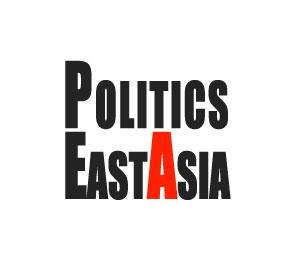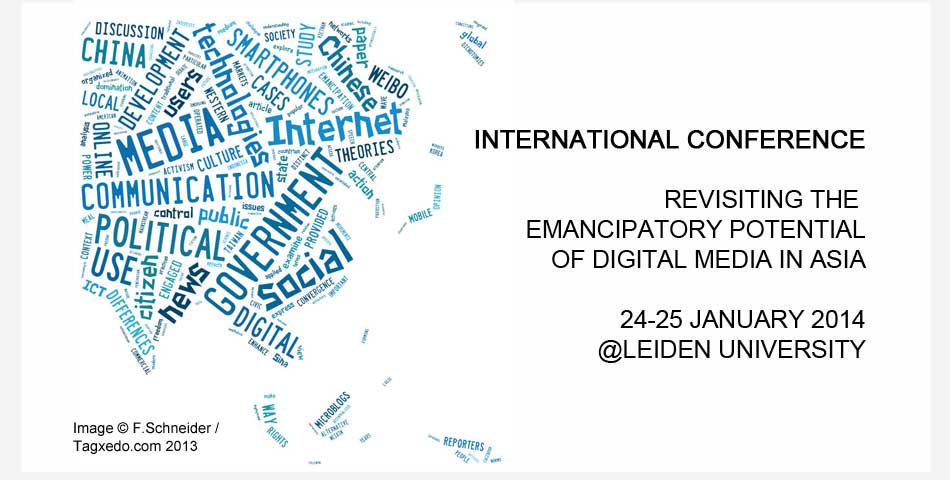DIAS Conference Programme
Asiascape: Digital Asia – Revisiting the Emancipatory Potential of Digital Media in Asia
Venue: Leiden University, Lipsius Building (Room 147), Cleveringaplaats 1, Leiden, The Netherlands.
Do digital media change the way that politics, social interactions, economic exchanges, and cultures work in Asia? How can we study such processes? And how can we deploy digital media ourselves to communicate our research and our arguments? These are some of the questions that this international conference at Leiden University will address.
The conference will also lead up to the publication of our new peer-reviewed academic journal Asiascape: Digital Asia. To launch our discussion, we have uploaded the introduction to the inaugural issue of the journal for your convenience, with the kind permission of Brill Publishers.
The programme and book of abstracts are also available for pdf download. If you wish to attend, but are not presenting, please register ahead of time on Asiascape.org by filling out the registration form.
Friday, 24 January 2014
08:30 – 09:15: Registration
09:15 – 09:30 Welcome
09:30 – 10:30 Keynote: Digital Methods. Richard ROGERS. Professor of New Media and Digital Culture at the University of Amsterdam, and Director of the Govcom.org Foundation and the Digital Methods Initiative, Amsterdam, the Netherlands.
10:30 – 11:00 Coffee Break
11:00 – 13:00 Panel 1: Converging Media, Converging Cultures?
Chair/Discussant: Bart BARENDREGT
1. Convergence and media freedom in Indonesia and Malaysia. Ross TAPSELL. Lecturer at the School of Culture, History and Language, College of Asia and the Pacific at the Australian National University.
2. Make lulz not war: How online remix and meme culture are empowering civic engagement in the Socialist Republic of Vietnam. Patrick E. SHARBAUGH. Lecturer at RMIT International University Vietnam, Ho Chi Minh City, Vietnam & Dang NGUYEN. Researcher at RMIT International University Vietnam, Ho Chi Minh City, Vietnam.
3. Digital technology in the wild and every day: Case studies from the slums of urban India. Nimmi RANGASWAMY, Adjunct Professor at the Indian Institute of Technology in Hyderabad, India & Payal ARORA, Assistant Professor at Erasmus University Rotterdam, the Netherlands.
4. Critical analysis of the power relations between the global and the local in Korea’s smartphone wave. Dal Yong JIN, Associate Professor at Simon Fraser University, Canada.
13:00 – 14:00: Lunch
14:00 – 16:00 Panel 2: The Politics of Digital Communication
Chair/Discussant: Florian SCHNEIDER
1. Towards a typological theory of e-government in China. Christian GÖBEL. Professor at the Department for East Asian Studies, University of Vienna.
2. Cosmopolitans all washed-up at the language barrier? Facts, potentials and challenges of digital media use in transnational migrant advocacy. Daniel KREMERS. Filmmaker & PhD researcher, Institute of Political Science and Japan Studies, Halle-Wittenberg University, Germany.
3. Songfan (meal delivery): Developing civic consciousness through e-commerce. Rui KUNZE. Postdoc at Erlangen-Nuremberg University, Germany.
4. Finding appropriate theories to study political communication on the Chinese Internet: using traditional dichotomies to assess differences between political speech on Facebook and Weibo. Gillian BOLSOVER. PhD researcher at the Oxford Internet Institute, Oxford University, UK.
16:00 – 16:15 Coffee Break
16:15 – 17: 00 Open Discussion – Part 1: Where is “digital Asia”?
17:00 – 17:15 Coffee Break
17:15 – 18:00 Open Discussion – Part 2: Digital Asia or digitized Asia? The challenge of studying digital media and communication in Asia.
19:00 – 21:00 Dinner (paper presenters and discussants only)
Saturday, 25 January 2014
10:00 – 12:00 Panel 3: Digital Media in Taiwan – A Spotlight Taiwan Event
Chair/Discussant: Jens DAMM
1. Korean Wave in Taiwan: (Digital) Cultural Identity and Cultural Economy. Ming-yeh RAWNSLEY, Research Associate at the SOAS, University of London, UK.
2. Dialogue between communication rights and news professionalism: Exploring the rise of citizen journalism both in China and Taiwan. TSAI Shiou-fen. Assistant Professor, Mass Communication Department, Hsuan Chuang University, Taiwan.
3. Media industries and cultural creative industries in Taiwan: Industrialisation of cultural policy in the digital era. KU Shu-shiun. PhD researcher at the University of Leeds, UK.
4. The internet and Taiwan’s new civic movement in the information age: Hung Chungchiu’s case. Bernard Chin-fu HUNG. Associate Professor at the Department of Political Science & Graduate Institute of Political Economy, National Cheng Kung University, Tainan, Taiwan.
12:00 – 13:00: Lunch
13:00 – 14:30 Panel 4: Beyond Utopia: the Emancipatory Potentials of Science Fiction in Digital Japan
Chair/Discussant: Chris GOTO-JONES
1. Dialectic of Utopia: Visualizing Future Politics in the Anime Psycho-Pass. Mari NAKAMURA. PhD researcher at Leiden University, the Netherlands.
2. Reflected Self vs. Self-Reflection: Nuclear Power, Genetic Engineering, and their Emotional Manifestations in Coppelion. Carl LI. PhD researcher at Leiden University, the Netherlands.
3. Emancipating Research: Game Design as Academic Intervention. Martin ROTH. PhD researcher at Leiden University, the Netherlands.
14:30 – 15:00: Coffee break
15:00 – 16:45 Panel 5: The Evolution of Chinese Microblogging and Mobile Texting
Chair/Discussant: HWANG Yih-jye
1. The aesthetics of microblogging: How the Chinese state controls Weibo. Jonathan BENNEY. Postdoc at Institute for US-China Issues, University of Oklahoma.
2. Becoming numb with myriad tragedies: Rights protection, tragicness competition, and Sina Weibo. ZENG Guohua, Adjunct researcher at the Amsterdam Centre of Globalisation Studies, University of Amsterdam, the Netherlands.
3. From Web 2.0 to SOLOMO (From Sina Weibo to Weixin). Gianluigi NEGRO. PhD researcher at the Università della Svizzera Italiana, Switzerland.
16:45 – 17:00 Coffee break
17:00 – 17:45 Concluding discussion: Who do digital media emancipate? The view from Asia.
17:45 – 18:00 Closing note
18:00 Drinks – all are welcome (location: English Pub North End)
NOTE: All information is preliminary and the details of this conference programme remain subject to organizational changes. For more information on the conference, see also the original call for papers and the conference information available on Asiascape.org for travel advice, registration, and other details.
We are grateful for the support of the following institutions in making this conference possible (alphabetical order): Brill Publishers, the International Institute for Asian Studies (IIAS), the Leiden University Institute for Area Studies (LIAS), the Leiden University research profile Asian Modernities and Traditions (AMT), the Ministry of Culture of the Republic of China (Taiwan), and the Netherlands Organization for Scientific Research (NWO).
Share This Post, Choose Your Platform!
3 Comments
Comments are closed.



[…] view the following conference programme for presentation titles, participants, and the conference […]
[…] than going chronologically through our conference programme, which is available online along with the book of abstracts, I want to take this opportunity to highlight what issues we came […]
[…] the launch conference for this journal in early 2014, our editorial team issued a provocation. We asked the participants of that event to […]